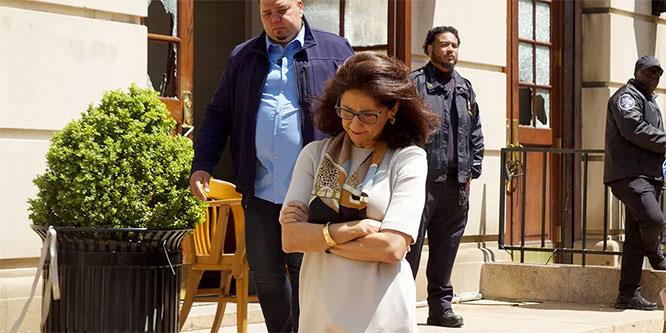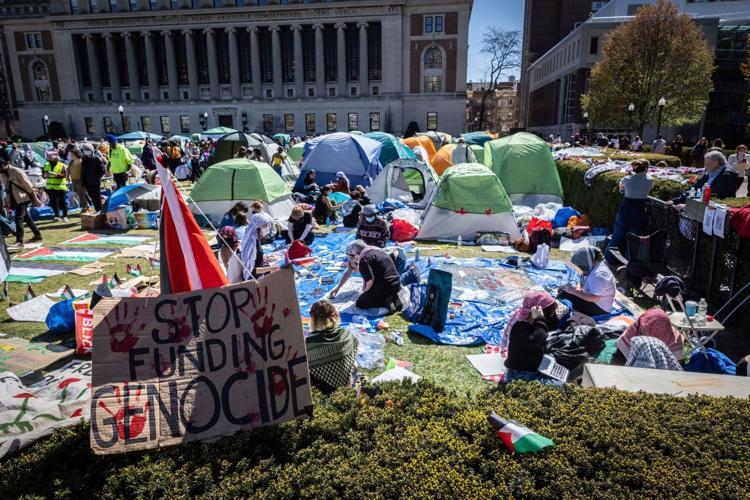06:25 PM
Friday, May 17, 2024
Books – Masrawy
After the great controversy it sparked when it informed the police of the storming of the university, and after a few weeks of demonstrations and sit-ins inside and outside the campus, the College of Arts and Sciences at Columbia University announced a no-confidence vote against the university’s president, Nemat Shafik.
The American magazine Forbes said in a report that the College of Arts and Sciences at Columbia University issued a no-confidence decision against the university’s president, Nemat Shafik, on Thursday, saying that she had violated the basic requirements of academic freedom and shared governance, and had participated in an unprecedented attack on student rights.

Forbes, in a report, said that the decision came after hundreds of faculty members at Columbia University’s College of Arts and Sciences cast their votes of no confidence in the university’s president, Nemat Shafik, a symbolic step that highlights the pro-Palestinian protests that rocked the New York City campus last month.
The no-confidence resolution — which faulted Shafiq for its handling of campus protests — is merely an expression of the will and opinion of the voting majority in the College of Arts and Sciences and “does not commit Columbia to a specific course of action,” Dean of Arts and Sciences Amy Hungerford said in an email. To faculty members during the announcement of results.
The vote of no confidence passed by 65%, with about 709 faculty members within the College of Arts and Sciences voting on the resolution, which was introduced by members of the American Association of University Professors at Columbia, according to Hungerford’s email.

The resolution specifically refers to Shafiq’s application of disciplinary measures against students and faculty protesters, who in recent weeks have called on Columbia to divest from Israeli companies linked to the occupying army by setting up camps on campus and occupying a university building — moves the university said violated Its policies.
The resolution notes that Shafik informed a congressional committee on April 17 that she would expel professors who made anti-Israel statements, accusing it of “violating the standards, practices, policies, and protections” upon which the university was founded.
It also criticizes its decision to contact the New York Police Department, to respond to the protests and in some cases to arrest student demonstrators, a decision that the association says was “made without consulting the University Senate.” The decision also says that Nemat Shafiq was involved in an unprecedented attack on students’ rights “that deserves “A firm and unequivocal condemnation.”
“Nimaat Shafiq continues to consult regularly with community members, including faculty, administration, and trustees, as well as with state, city, and community leaders,” said Ben Chang, a Columbia University spokesman. “She values the efforts of those who work alongside her on the long road ahead to healing.” “Our community.”

According to Forbes, about 900 employees were eligible to vote, out of a total of 4,600 full-time employees at the university.
In her letter to faculty Thursday, Hungerford noted that many faculty members believe the vote of no confidence “should not be understood as calling for the president’s resignation, and the text of the statement does not suggest resignation as the desired outcome.”
Instead, faculty members proposed options, including censure and calling for further investigation into what happened on campus.
Colombia has become the epicenter of the university protests that have swept the nation ever since, leading to hundreds of arrests and sometimes tense confrontations between protesters and police and not always between students and faculty. The protests, prompted by the war on Gaza, have been largely peaceful.

Although critics argue it has led to anti-Semitic rhetoric on some campuses. Protesters called on universities generally to divest from companies linked to Israel – a controversial concept that may be difficult to implement due to the large size of some of the companies involved.
Earlier this year, former Harvard University President Claudine Guy resigned in part over criticism of her handling of anti-Semitism on campus as war protests erupted.
